Whether you’ve got a narrow face or a bigger nose, finding a pair of glasses that fits perfectly is now possible thanks to the company You Mawo. Glasses are made-to-measure using 3D scanning and printing technology developed by the company itself. For developing this technology of the future the jury of the KfW Entrepreneurs’ Award selected You Mawo as the state winner for Baden-Württemberg.
Video: A visit to You Mawo, 2019 winner of the KfW Entrepreneurs’ Award for the state of Baden-Württemberg (KfW Bankengruppe/n-tv). This video is only available in German.
In 2016, a team of four men signed up for the international trade show for optics and design. At the booth for their start-up You Mawo, Daniel Miko, Stephan Grotz, Sebastian Zenetti and Daniel Szabo hoped to find potential clients to whom they could promote their new business idea: tailored glasses made with a 3D printer. “We set ourselves a limit of no more than 50 clients for the trade show – at that time, there was no way our production facilities could handle any more than that,” remembers Daniel Miko. Within two days, they had reached their goal and the team was finally confident that You Mawo was ready for the market.
You Mawo is short for “your magic world”. Something else that was magical were the company’s initial sales figures: in 2017 – just a year after the market launch – 20,000 pairs of unique You Mawo glasses were presented to customers. The special thing about the designs is that, no matter what shape or size they want, every customer can create their own unique frames. The frames are lighter than conventional models and are produced using a sustainable process.
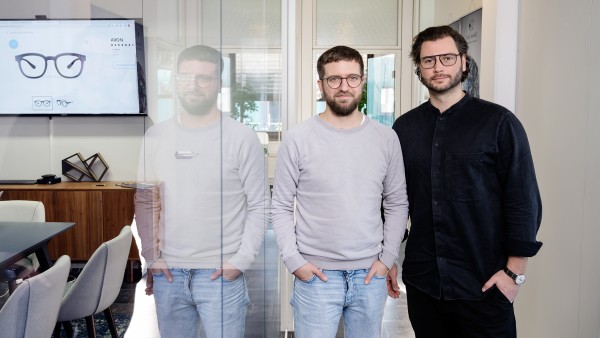
Managing Directors Daniel Miko (left) and Sebastian Zenetti founded the company You Mawo together with two colleagues in 2016.
Do-it-yourself branding from the algorithm to the design
According to Daniel Miko, the idea was born during a round-the-world trip. “We wanted to produce custom-made models but on a mass scale. However, finding a solution suitable for this task was initially the biggest hurdle.” A comparable form of production technology did not even exist at that time. For this reason, the team started by focusing on scanners used in architecture, and then fine-tuning the technology to achieve the result they wanted. The entrepreneurs all complement one another perfectly: “Daniel Szabo is our numbers man, Stephan Grotz understands big data, while Sebastian and I are experts in the design and optics market,” explains Miko. “The software, the app, the algorithm – we developed it all from scratch.”
Zenetti and Miko developed the glasses designs based on over one hundred facial scans. The models are produced in a 3D printer from polyamide powder and are particularly light and flexible. One benefit for the environment is that the powder left over after printing can be reused in the production process and does not have to be thrown away as excess material. What’s more, when you are using a 3D printing process, it does not matter whether you are making hundreds of the same model or one hundred different pairs in the production process. As such, the printer can print large quantities of different models at once.
Read more under the image gallery.
The path to custom-fit glasses: Optician Sabine Pfeiffer from Constance uses a portable scanner to record the customer’s individual face topography. The 3D model is then sent to You Mawo.
KfW Entrepreneurs’ Award
In October 2019, the KfW Entrepreneurs’ Award was presented to 16 state winners and one national winner in recognition of their business ideas. You Mawo, state winner of Baden-Württemberg was one of them. Applications for this year's award can be submitted starting 1 April 2020.
Learn moreFrom a facial scan to bespoke glasses
Another reason why the You Mawo concept is so successful is that it not only offers benefits to customers, but also makes the process simpler for opticians. Stephan Grotz developed the You Mawo app, which opticians can use to scan their customers’ faces. The scanner itself is produced by the US-based provider Structure. “It is an infra-red scanner that you just plug into an iPad. The customer’s scanned face is sent to us with basic models. The scan enables us to produce a pair of glasses that are perfectly tailored to the customer’s head shape and nose angle,” explains Daniel Miko. And the process has been even easier since January 2020: You Mawo can now also directly activate the face ID cameras on new iPads and iPhones – which means the scanning process is no longer needed.
No special tools are needed for production; the customer’s data is enough. In the final step in the You Mawo system, the glasses are adapted to incorporate special requests, such as engraving. The model is then ready to go to production. The machinery and materials come from Germany. You Mawo works with a partner that is responsible for the 3D printing. “A machine for the production process costs around 500,000 euros – and that doesn’t include colouring and a finishing process for the glasses,” says Miko, explaining the cooperation.
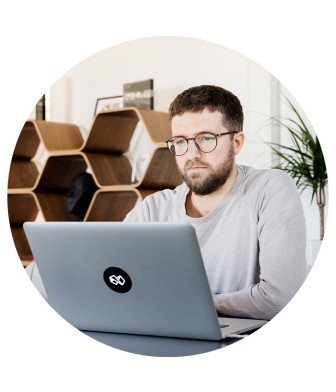
“The software, the app, the algorithm – we developed it all from scratch.”
One production cycle lasts 18 hours and prints 100 pairs of glasses. They take eight hours to cool down. However, at the end of this stage, the frames are still white and very rough, like sand paper. Sanding down, shaping and dyeing is the final step before the glasses head to the opticians. Customers can pick up their bespoke glasses after no more than three weeks. Over 750 opticians in 20 countries now use the infra-red scanner for their business. “To begin with, we were expecting a conservative response, especially in the German-speaking region. But we were positively surprised – almost all opticians were immediately open to the new technology,” explains Daniel Miko.
At present, You Mawo is the German, Austrian and Swiss market leader for 3D printed glasses. The team’s big vision is to stop having to send the frames around the world and instead set up their own production facilities in each country. This would not only save time and money in future – it would also create new jobs. “However, the one thing that is particularly close to our hearts is spreading knowledge about custom-made glasses. This will allow even people with unusual measurements to find the ideal pair of glasses,” says Daniel Miko.
Published on KfW Stories: 12 February 2020.

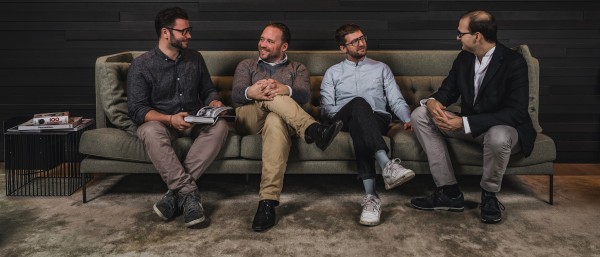


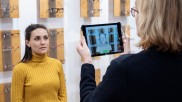
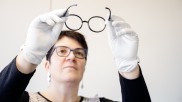
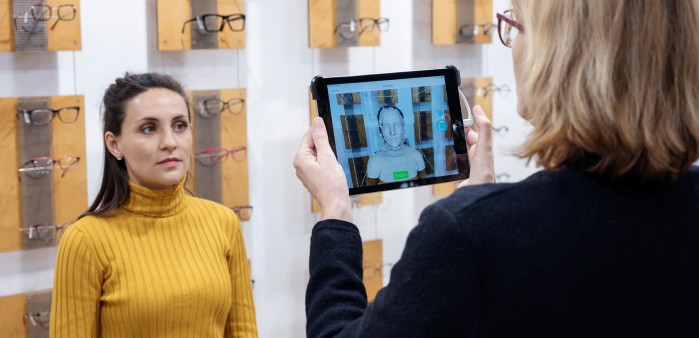

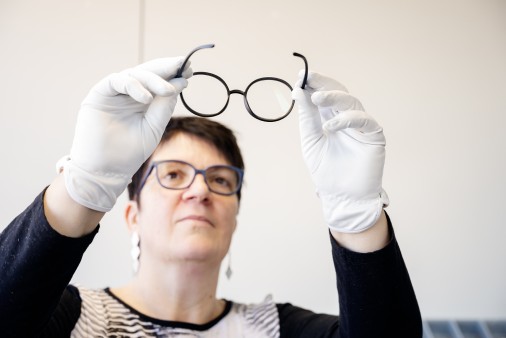

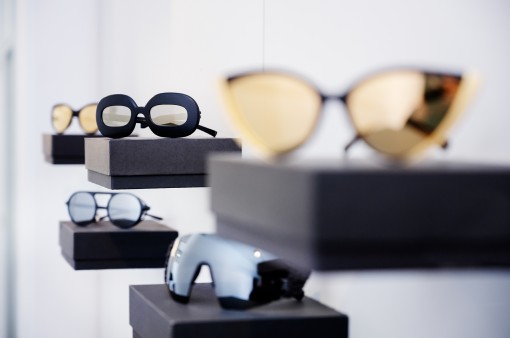





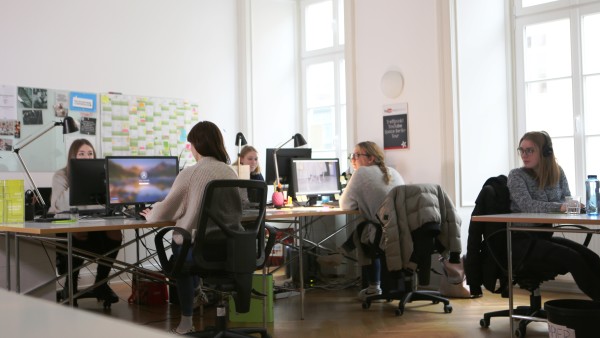
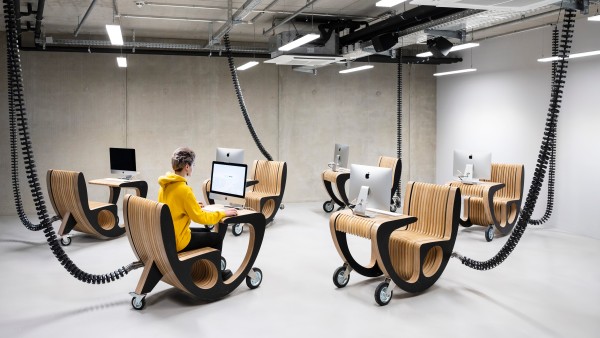
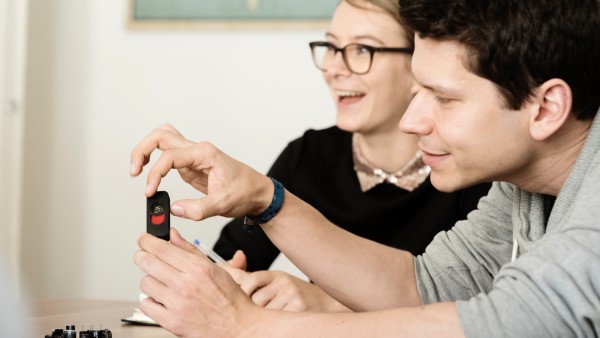
Data protection principles
If you click on one of the following icons, your data will be sent to the corresponding social network.
Privacy information